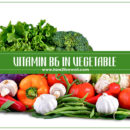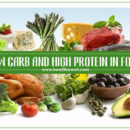Foods Highest in Vitamin K
Vitamin K which is not a single nutrient but the name given to a group of vitamins of similar composition is necessary for normal blood clotting and may be needed for other activities. The human body gets vitamin K from certain foods and from bacteria that normally live in the intestines. Available scientific evidence does not support the use of vitamin K supplements for cancer treatment or prevention.
The two main groups of vitamin K that occur naturally are vitamin K1 (phylloquinone) and K2 (menaquinone). K1 is found in many vegetables and K2 is produced by bacteria. Vitamin K is also promoted as an ingredient in some cosmetic or herbal creams to lighten redness caused by broken blood vessels and to treat skin irritation (burns and sunburns) and scarring. Promoters recommend that these so-called “clarifying” creams be applied to the skin every day for several weeks.
Vitamin K plays a crucial role in proper blood coagulation (clotting), which prevents excessive bleeding. It also helps the body absorb calcium, and thus it’s an essential aspect of bone health. Many foods, especially leafy vegetables, are abundant in Vitamin K, so make sure you’re eating right and maintaining a Vitamin K rich diet.
1. Sun-Dried Tomatoes:
Sun-dried tomatoes make a tasty addition to salads, sauces, pasta dishes, sandwiches, and pizza. There are many ways to enjoy them, so start experimenting to try and find your favorite ways of incorporating these healthy veggies into your diet. One cup of sun-dried tomatoes contains 29% of the daily recommended amount of Vitamin K. In addition, they’re a great source of lycopene, Vitamin A, Vitamin C, calcium, and iron. Serving Size (1 cup), 23.22 micrograms of Vitamin K (29% DV), 139 calories.
2. Celery:
Celery is a flavorful vegetable that’s easy to prepare when you’re in the mood for a healthy snack. One medium stalk of celery provides 15% of the recommended intake of Vitamin K, and it’s also a great source of folic acid, antioxidants, calcium, and potassium. And at only 6 calories per stalk, you can enjoy it in abundance without having to worry about your waistline. Serving Size (1 medium stalk), 11.72 micrograms of Vitamin K (15% DV), 6 calories.
3. Okra:
A half-cup serving of sliced okra contributes 34 micrograms of Vitamin K to your diet, or about 43% of the recommended total for the day. If you’re not sure how to get more of this Vitamin K rich vegetable into your diet, try serving it with tomato soup, corn, rice, or shrimp. Serving Size (1/2 cup), 34 micrograms of Vitamin K (43% DV), 19 calories.
4. Blueberries:
Blueberries are an incredible health food to add to your diet. They’re full of fiber, potassium, iron, copper, zinc, and several antioxidants. To get more Vitamin K in your diet, enjoy a cup of blueberries each day and you’ll get 36% of the recommended daily value. For some simple serving ideas, add some blueberries to your yogurt, salad, or oatmeal for a healthy and flavorful snack. Serving Size (1 cup), 28.56 micrograms of Vitamin K (36% DV), 84 calories.
5. Dried Sage:
Many people use dried herbs to spice up their cooking every once in a while, but not everyone knows about the many health benefits they can provide. Dried sage is a great source of Vitamin K, with one tablespoon providing an impressive 43% of the daily recommended amount. Add more dried sage to your cooking for added benefits such as antioxidants and anti-inflammatory agents. Serving Size (1 tablespoon), 34.29 micrograms of Vitamin K (43% DV), 6 calories.
6. Kale:
If you’re used to seeing kale tucked away at the edge of your plate as a garnish, make a change and give it a place in the heart of some of your favorite meals. One cup of chopped kale provides your body with essential Vitamin K—nearly 700% of the recommended daily total, in fact. It’s also loaded with other vitamins including A and C, as well as iron and calcium. Serving Size (1 cup), 547.39 micrograms of Vitamin K (684% DV), 34 calories.
7. Cabbage:
Raw or steamed cabbage can help treat high cholesterol, stomach ulcers, arthritis, weight gain, and constipation. A cup of chopped cabbage contains 76 micrograms of Vitamin K, or nearly 100% of the total daily value. Eat more cabbage to improve your intake of Vitamin K as well as Vitamin C, fiber, Vitamin E, calcium, magnesium, and potassium. Serving Size (1 cup chopped), 76 micrograms of Vitamin K (95% DV), 22 calories.
8. Blackberries:
A blackberry’s rich, dark color is indicative of the many antioxidants housed inside it. Blackberries are abundant in minerals such as copper and manganese, as well as vitamins such as Vitamin C and Vitamin K. One cup of these succulent berries contains 36% of the Vitamin K the average adult should consume per day. Serving Size (1 cup), 28.51 micrograms of Vitamin K (36% DV), 62 calories.
9. Spinach:
One of the healthiest, most nutrient-rich foods you can add to your diet is spinach. Whether raw or cooked, spinach is a stellar source of several vitamins, minerals, and antioxidants, including Vitamin C, iron, calcium, and Vitamin K. If you’re not sure how to add more spinach to your diet, start by using it as the leafy base for your salads, sautéing it with olive oil and garlic, adding it as a topping on your pizza, or shredding and cooking in your favorite pasta sauce. Serving Size (1 cup), 144.87 micrograms of Vitamin K (181% DV), 7 calories.
10. Broccoli:
When eaten regularly, broccoli contributes to the health of the nervous system, eyes, heart, bones, blood pressure, and skin. Get more broccoli in your diet in order to help meet your zinc, calcium, potassium, Vitamin C, and Vitamin K needs every day. Just a half a cup provides well over the recommended daily amount of Vitamin K. Serving Size (1/2 cup), 110.06 micrograms of Vitamin K (138% DV), 27 calories.














